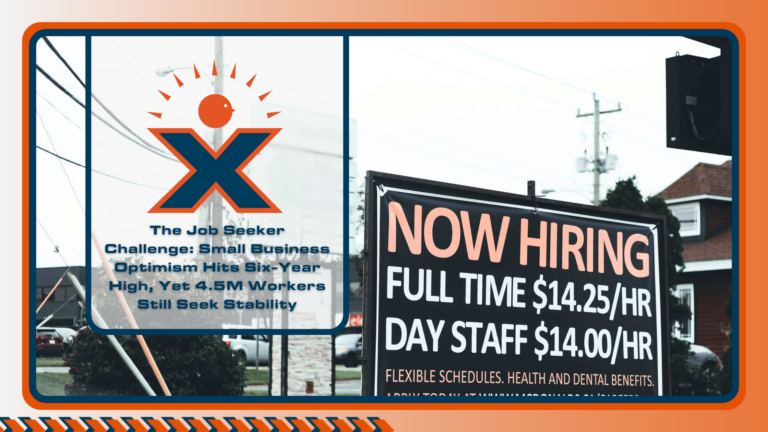Opportunities often come when we least expect them, presenting themselves as a sudden job offer, a chance to take on a new position, or an unexpected career opportunity. In the staffing industry, being prepared for these moments is key to seizing them with confidence and poise. While it’s easy to think that luck plays the most significant role in these scenarios, the truth is, that preparation makes all the difference. By staying vigilant, building a strong network, and continuously honing your skills, you can always be ready for the next opportunity.
Recognizing Opportunities
Stay Alert and Aware
The first step in being ready for unexpected opportunities is to stay alert and aware of your surroundings. Opportunities can come in many forms. Sometimes they look like a casual conversation with a colleague or a chance encounter at a networking event. Training yourself to recognize these moments requires an open mind and a keen sense of observation. For example, understanding the broader job market trends and shifts within the staffing industry can help you identify potential opportunities early. When you stay informed about what’s happening around you, you’re better positioned to spot an opportunity before it becomes obvious to others.
Look beyond the obvious and see the hidden potential in everyday situations. Not every opportunity will present itself with a clear label; some may be disguised as challenges or unexpected changes. For instance, a temporary position might initially seem less appealing, but it could open doors to new connections. These same connections can eventually lead to a full-time job offer. By maintaining awareness of your environment and being open to new experiences, you can turn seemingly ordinary moments into extraordinary opportunities.
Build Connections Before You Need Them
Networking is a powerful tool in the staffing industry and beyond. Building a strong network before you need it is essential to being ready for unexpected opportunities. When you have a robust network of contacts, you’re more likely to hear about new job openings, potential clients, or exciting projects. Engaging in networking activities regularly. Some such as attending industry conferences, joining professional organizations, or participating in online communities, helps you stay connected with key players in your field. These connections can provide valuable insights and information that may lead to your next big opportunity.
It isn’t just about what you can gain; it’s also about what you can offer. By providing value to your network—whether through sharing industry knowledge, offering support, or connecting others—you establish yourself as a resourceful and dependable contact. This reputation can make you a go-to person when opportunities arise, as people naturally want to collaborate with those they trust and respect. Building these relationships now ensures you are top of mind when a job opportunity or position becomes available.
Develop a Growth Mindset Outside your Job
To be ready for opportunities that come unexpectedly, it’s crucial to cultivate a growth mindset. This involves viewing challenges not as setbacks but as opportunities for growth and learning. Adopting this mindset means being willing to embrace new experiences, even if they seem intimidating at first. A growth mindset encourages resilience, which is vital when facing the uncertainties that come with unexpected opportunities. When you learn to see every experience as a chance to develop new skills or gain knowledge, you are always in a state of readiness.
A positive outlook is equally important in preparing for the unexpected. Staying open to new possibilities, even when they push you out of your comfort zone, allows you to be more adaptable and flexible. For instance, if you’re offered a new position that requires relocating or learning a new set of skills, having a growth mindset can help you approach the situation with enthusiasm rather than fear. Being mentally prepared enables you to tackle new opportunities with confidence and readiness.
Have Continuous Learning as a Strategy
Continuous learning is a strategic approach to staying prepared for opportunities that may arise unexpectedly. In a constantly evolving job market, particularly within the staffing industry, keeping your skills up-to-date is essential. This could mean enrolling in formal courses, attending workshops, or engaging in self-directed learning. By expanding your skillset, you increase your value to potential employers or clients. Making you a more attractive candidate when a new opportunity presents itself.
Beyond formal education, applying your new skills in real-world scenarios can reinforce your learning and adaptability. Practical experience helps you understand how to utilize your skills effectively in different situations, making you more versatile. Additionally, staying current with industry trends and tools ensures that when a job offer or new position becomes available, you are already equipped with the knowledge and skills to step into the role confidently.
Ensuring You Can Seize Opportunities Without Delay
Financial Readiness
Financial readiness is a critical component of being prepared for unexpected opportunities. Having a financial buffer or emergency fund allows you to take advantage of opportunities without the stress of financial insecurity. Whether it’s a new job that requires a move or a chance to invest in a promising startup, being financially prepared gives you the freedom to say yes when the right opportunity knocks. It’s also essential to have a financial plan that aligns with your career or business goals. Regularly reviewing and updating your financial strategy ensures you have the necessary resources when an opportunity arises. Furthermore, understanding different investment options that offer quick liquidity can provide you with the financial flexibility needed to act swiftly and decisively.
Personal Branding to Position Yourself for Unexpected Offers
Personal branding plays a significant role in positioning yourself for unexpected offers. Your personal brand is essentially your professional reputation—what people think of when they hear your name. Developing a strong personal brand involves highlighting your unique skills, experiences, and values. Regularly updating your online profiles, such as LinkedIn, and maintaining a personal website or portfolio ensures that when someone searches for you, they see a polished, professional image. Sharing thought leadership content is another effective way to build your personal brand. By contributing articles, participating in webinars, or speaking at industry events, you position yourself as an expert in your field. This visibility can lead to more job offers or invitations to take on new positions, as people seek out professionals who stand out in their industry.
Keeping Your Professional Portfolio Ready
Staying organized is another key aspect of being prepared for unexpected opportunities. Keeping an up-to-date resume and professional portfolio ensures that you’re ready to respond quickly when an opportunity arises. Organizing your professional documents, such as certificates, references, and work samples, allows for easy access and swift decision-making. This level of preparedness can make all the difference when a potential employer or client requests your credentials at a moment’s notice.
Using tools and apps to track your achievements and milestones can help you maintain an organized professional portfolio. Documenting your accomplishments as they happen ensures you have a comprehensive record of your experience, making it easier to showcase your value when an opportunity arises. This proactive approach can give you a competitive edge in a fast-paced job market.
Tools That Keep You Prepared
Leveraging technology is essential for staying prepared for unexpected opportunities. There are numerous digital tools available that can help you stay connected, informed, and organized. For example, networking platforms like LinkedIn can be used to keep in touch with industry contacts and stay updated on job openings. Similarly, job alert services and industry news apps can help you stay informed about new opportunities in real time. Productivity apps are also useful for managing your tasks and staying organized. Ensuring that you are always prepared to make quick decisions when opportunities arise. Setting up alerts and notifications for job offers, market changes, or networking events can help you stay ahead of the curve. By incorporating these tools into your daily routine, you ensure that you are always ready to seize the next opportunity.
Be Open to Job Change and New Direction, Flexibility is Key!
You must be open to change and new directions if you hope to be prepared for unexpected opportunities. Flexibility allows you to adapt to new roles, responsibilities, and environments quickly. Whether it’s taking on a new job offer that requires learning new skills or a position that demands a relocation, being adaptable enables you to handle these transitions smoothly. Practicing flexibility by exposing yourself to diverse roles and projects can prepare you for the unpredictability of the job market.
Staying open to unconventional opportunities that may not align perfectly with your initial career plan can lead to unexpected successes. Viewing change as a chance for growth rather than a threat allows you to approach new opportunities with a positive mindset. This adaptability makes you more attractive to potential employers and positions you as a valuable asset in any organization.
Turning Setbacks into Opportunities!
Finally, learning to reframe challenges as opportunities is an essential skill for turning setbacks into future successes. Instead of viewing setbacks as failures, consider them as valuable learning experiences that can lead to growth. Analyzing what went wrong and identifying lessons learned can help you avoid similar pitfalls in the future and prepare you for new opportunities. By shifting your perspective, you can turn perceived negatives into positives and use these experiences to build resilience.
Developing a proactive plan to address challenges also allows you to be ready for the next job opportunity that comes your way. By taking a constructive approach to setbacks, you can position yourself to take advantage of future opportunities, even when they come unexpectedly. Remember, every challenge is a potential opportunity in disguise, waiting to be seized.
Looking for your next job opportunity near you? Explore rewarding careers today with NEXTAFF! Find the perfect fit for your skills and aspirations. Learn More About Candidate Services today!












